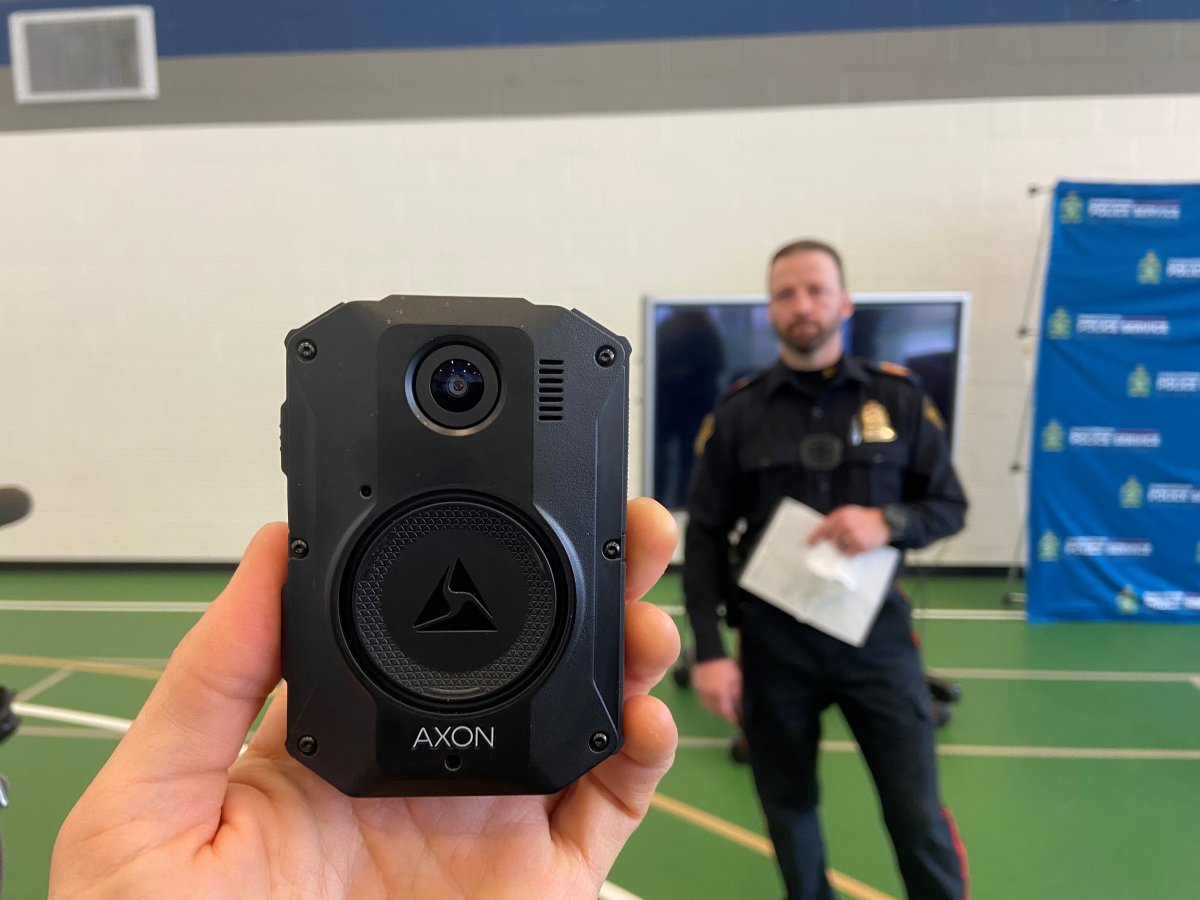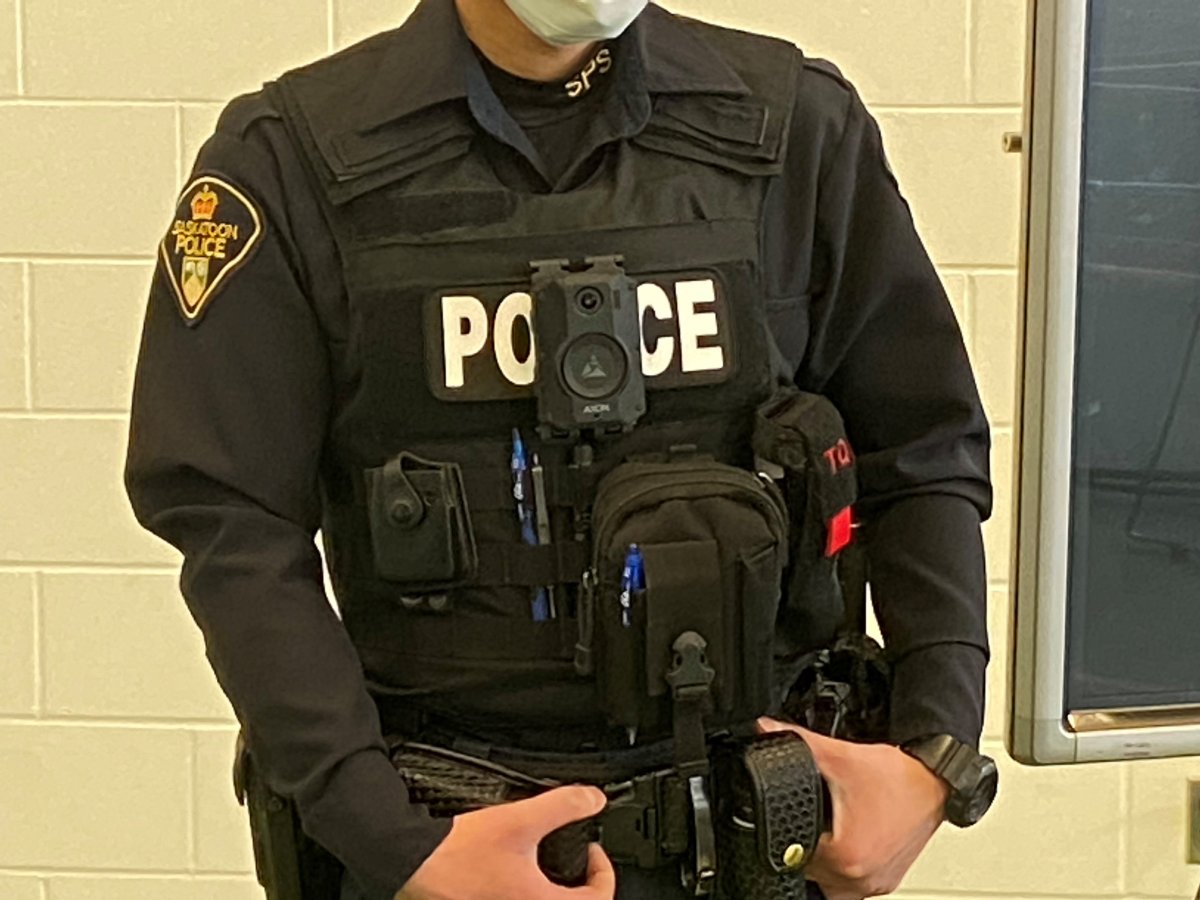Training video footage, supplied by the Saskatoon Police Service (SPS), shows what will likely be a new form of evidence — footage collected with body-worn cameras.

At a press conference on Tuesday, Chief Troy Cooper and Sgt. Tom Gresty unveiled the cameras 40 officers will be training with and then wearing for a two-year pilot project.
“We expect to see success in reducing court times and reducing the frustrating wait times that people who make public complaints, and the officers have to wait for the results as well,” Cooper said.
Gresty, who is leading the program, said training began this week.
He demonstrated the cameras for reporters, showing how officers press down on a large button on the front of the device to turn it on. Doing so elicits a loud beep, though the officer wearing the smartphone-sized camera can change the noise.
Once it’s activated, three LED lights begin to shine — though Gresty said officers can turn those off during tactical situations, like when an officer is approaching a suspect with a firearm and doesn’t want to give away their position.
In terms of when the cameras are on and off, the sergeant said officers will be responsible. They are supposed to activate the camera when conducting investigative or enforcement work and they’re supposed to treat it like a seatbelt, in that they should know to always put it on when needed.
He said the cameras should always be visible to other people and said officers will inform others they are being recorded as soon as possible.
Gathering footage, especially in a private place, he said, depends on the lawful authority of the officer’s attendance at a location.
“We’re going to be going into private places, we’re going to go into people’s residences… hospitals, possibly into schools,” he said.
“So there’s a balance between privacy legislation and the infringing of privacy rights of the individual being recorded (and) balancing that with a law enforcement need.”
Footage gathered by officers will be stored on servers that are in Canada for 25 months and will only be accessible if released as evidence or through a freedom of information request — though officers will be able to view it.
- Train goes up in flames while rolling through London, Ont. Here’s what we know
- Budget 2024 failed to spark ‘political reboot’ for Liberals, polling suggests
- Wrong remains sent to ‘exhausted’ Canadian family after death on Cuba vacation
- Peel police chief met Sri Lankan officer a court says ‘participated’ in torture
“Each interaction that we record, those incidences will be stored securely on a secure hard drive on the camera. The officer will have access to those recordings throughout the day through their smartphone,” Gresty said.
Cooper says the purpose of the program is to figure out which camera is best and how having the footage affects staff workloads.
He said he didn’t expect using 40 cameras over two years would provide enough data to indicate whether the program was helping. He said the SPS will look to other programs in Calgary and Toronto and expect to see the same results.
“Unless we see something to the contrary, we’re going to assume we’ll see the same with our 40 cameras that as they saw with 1,600 or 2,000 cameras,” he said.
Video evidence, he said, is increasingly becoming more accepted and expected, like with police dashcam footage or detention footage.
He said no new oversight mechanisms will be put in place because the Saskatchewan Public Complaints Commission has access to footage.
But for all the benefits Cooper touted, a policy expert cautioned cameras can make things worse.
“The literature really shows us that there’s a risk that cameras could actually harm community policing relationships, like when batteries die, for example, or a camera isn’t turned on properly or a video is withheld from the public,” Scott Thompson said.
He said police need to be very clear about the rules and aims of the program, and especially how the police will achieve them.
“Access (to the footage) is incredibly important to accountability, and if the public has an understanding that these cameras are about accessibility and accountability, there’s going to be an expectation to quickly get this information and be able to look it over,” he told Global News in an interview.
On top of that, storing high quality footage for years can be expensive.
During the press conference, Cooper said funding for the pilot project had already been approved as part of the city’s recent two-year budget.
Activist Erica Violet Lee told Global News she would rather see the public money and effort go towards helping people find a way to live, pointing out there is no grocery store in Saskatoon’s inner city.
Lee is very clear that she believes police should be abolished and not reformed. But in terms of improving police interaction with Indigenous people, she said cameras don’t help.
“The nature of the police in Canada and in this province has been always to protect people who own property, always to protect the richest,” she said.
Cameras don’t change the level of accountability, she told Global News. And part of the problem is to whom the police are accountable.
“The answer is not poor people, it’s not First Nations people. I see the police being accountable to themselves first and foremost,” Lee said.
During the press conference, Gresty couldn’t say exactly when officers would start wearing their cameras on patrol because it depends on when they finish their training. But he estimated that would begin by the end of the month.







Comments